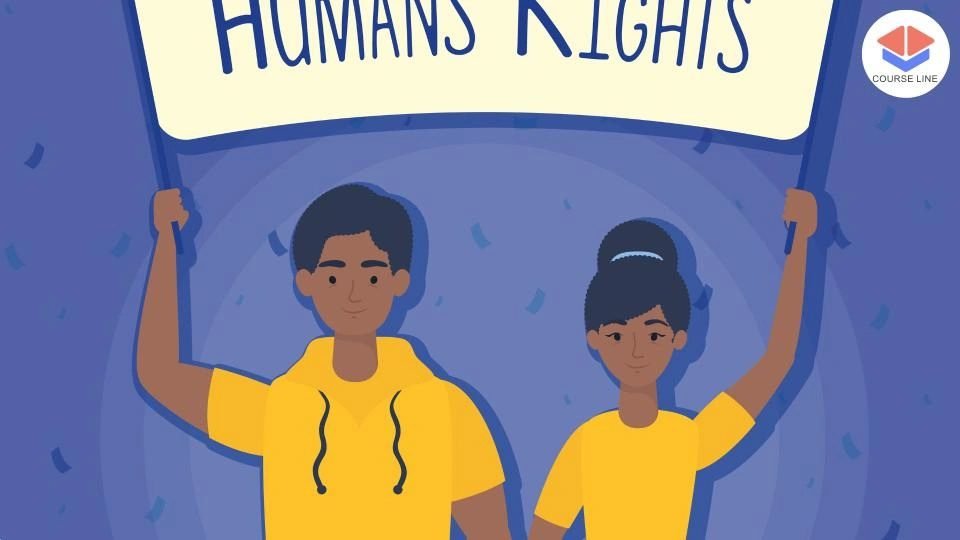Course Features
Price
Study Method
Online | Self-paced
Course Format
Reading Material - PDF, article
Duration
6 hours, 45 minutes
Qualification
No formal qualification
Certificate
At completion
Additional info
Coming soon
- Share
Overview
The "Human Rights Level 3 Advanced Diploma" provides a thorough understanding of human rights concepts, law, and advocacy strategies. The course begins with an introduction to human rights, covering the historical development of human rights, key international instruments such as the Universal Declaration of Human Rights, and the core principles and values that form the foundation of human rights law. Students will also gain insight into the role of international human rights law, examining major documents such as the European Convention on Human Rights (ECHR), and the International Covenants on Civil and Political Rights (ICCPR) and Economic, Social, and Cultural Rights (ICESCR).
Students will delve into the specifics of human rights in the UK, exploring landmark legislation such as the Human Rights Act 1998 and its application within UK law. The course also covers the devolution of human rights in Scotland, Wales, and Northern Ireland, alongside UK case law and important human rights cases. In addition, students will learn about the human rights institutions within the UK that work to uphold and protect human rights.
The course includes a comprehensive exploration of specific human rights issues, such as the right to life and capital punishment, freedom of expression and media rights, minority rights and discrimination, gender equality, women's rights, and LGBTQ+ rights. Students will also learn about human rights advocacy and practice, developing essential skills in advocacy strategies, research, documentation, and report presentation. Real-world case studies will provide practical examples of successful human rights advocacy, and students will engage with human rights organizations and learn how to contribute to their efforts.
Contemporary challenges in human rights are explored, including the implications of digital technology, refugee and migrant rights, environmental justice, and the complex relationship between terrorism, national security, and civil liberties. The course also covers emerging global human rights challenges, ensuring students are equipped to understand and address the evolving landscape of human rights issues.
Ethical considerations are woven throughout the course, including debates around cultural relativism vs. universalism, human rights and business ethics, and the role of NGOs and civil society in protecting human rights. With this knowledge, students will be well-prepared to navigate the ethical dilemmas that often arise in the field of human rights.
Who is this course for?
The "Human Rights Level 3 Advanced Diploma" provides a thorough understanding of human rights concepts, law, and advocacy strategies. The course begins with an introduction to human rights, covering the historical development of human rights, key international instruments such as the Universal Declaration of Human Rights, and the core principles and values that form the foundation of human rights law. Students will also gain insight into the role of international human rights law, examining major documents such as the European Convention on Human Rights (ECHR), and the International Covenants on Civil and Political Rights (ICCPR) and Economic, Social, and Cultural Rights (ICESCR).
Students will delve into the specifics of human rights in the UK, exploring landmark legislation such as the Human Rights Act 1998 and its application within UK law. The course also covers the devolution of human rights in Scotland, Wales, and Northern Ireland, alongside UK case law and important human rights cases. In addition, students will learn about the human rights institutions within the UK that work to uphold and protect human rights.
The course includes a comprehensive exploration of specific human rights issues, such as the right to life and capital punishment, freedom of expression and media rights, minority rights and discrimination, gender equality, women's rights, and LGBTQ+ rights. Students will also learn about human rights advocacy and practice, developing essential skills in advocacy strategies, research, documentation, and report presentation. Real-world case studies will provide practical examples of successful human rights advocacy, and students will engage with human rights organizations and learn how to contribute to their efforts.
Contemporary challenges in human rights are explored, including the implications of digital technology, refugee and migrant rights, environmental justice, and the complex relationship between terrorism, national security, and civil liberties. The course also covers emerging global human rights challenges, ensuring students are equipped to understand and address the evolving landscape of human rights issues.
Ethical considerations are woven throughout the course, including debates around cultural relativism vs. universalism, human rights and business ethics, and the role of NGOs and civil society in protecting human rights. With this knowledge, students will be well-prepared to navigate the ethical dilemmas that often arise in the field of human rights.
Requirements
The "Human Rights Level 3 Advanced Diploma" provides a thorough understanding of human rights concepts, law, and advocacy strategies. The course begins with an introduction to human rights, covering the historical development of human rights, key international instruments such as the Universal Declaration of Human Rights, and the core principles and values that form the foundation of human rights law. Students will also gain insight into the role of international human rights law, examining major documents such as the European Convention on Human Rights (ECHR), and the International Covenants on Civil and Political Rights (ICCPR) and Economic, Social, and Cultural Rights (ICESCR).
Students will delve into the specifics of human rights in the UK, exploring landmark legislation such as the Human Rights Act 1998 and its application within UK law. The course also covers the devolution of human rights in Scotland, Wales, and Northern Ireland, alongside UK case law and important human rights cases. In addition, students will learn about the human rights institutions within the UK that work to uphold and protect human rights.
The course includes a comprehensive exploration of specific human rights issues, such as the right to life and capital punishment, freedom of expression and media rights, minority rights and discrimination, gender equality, women's rights, and LGBTQ+ rights. Students will also learn about human rights advocacy and practice, developing essential skills in advocacy strategies, research, documentation, and report presentation. Real-world case studies will provide practical examples of successful human rights advocacy, and students will engage with human rights organizations and learn how to contribute to their efforts.
Contemporary challenges in human rights are explored, including the implications of digital technology, refugee and migrant rights, environmental justice, and the complex relationship between terrorism, national security, and civil liberties. The course also covers emerging global human rights challenges, ensuring students are equipped to understand and address the evolving landscape of human rights issues.
Ethical considerations are woven throughout the course, including debates around cultural relativism vs. universalism, human rights and business ethics, and the role of NGOs and civil society in protecting human rights. With this knowledge, students will be well-prepared to navigate the ethical dilemmas that often arise in the field of human rights.
Career path
The "Human Rights Level 3 Advanced Diploma" provides a thorough understanding of human rights concepts, law, and advocacy strategies. The course begins with an introduction to human rights, covering the historical development of human rights, key international instruments such as the Universal Declaration of Human Rights, and the core principles and values that form the foundation of human rights law. Students will also gain insight into the role of international human rights law, examining major documents such as the European Convention on Human Rights (ECHR), and the International Covenants on Civil and Political Rights (ICCPR) and Economic, Social, and Cultural Rights (ICESCR).
Students will delve into the specifics of human rights in the UK, exploring landmark legislation such as the Human Rights Act 1998 and its application within UK law. The course also covers the devolution of human rights in Scotland, Wales, and Northern Ireland, alongside UK case law and important human rights cases. In addition, students will learn about the human rights institutions within the UK that work to uphold and protect human rights.
The course includes a comprehensive exploration of specific human rights issues, such as the right to life and capital punishment, freedom of expression and media rights, minority rights and discrimination, gender equality, women's rights, and LGBTQ+ rights. Students will also learn about human rights advocacy and practice, developing essential skills in advocacy strategies, research, documentation, and report presentation. Real-world case studies will provide practical examples of successful human rights advocacy, and students will engage with human rights organizations and learn how to contribute to their efforts.
Contemporary challenges in human rights are explored, including the implications of digital technology, refugee and migrant rights, environmental justice, and the complex relationship between terrorism, national security, and civil liberties. The course also covers emerging global human rights challenges, ensuring students are equipped to understand and address the evolving landscape of human rights issues.
Ethical considerations are woven throughout the course, including debates around cultural relativism vs. universalism, human rights and business ethics, and the role of NGOs and civil society in protecting human rights. With this knowledge, students will be well-prepared to navigate the ethical dilemmas that often arise in the field of human rights.
-
- Introduction to the concept of human rights 00:10:00
- Historical development of human rights 00:10:00
- Key international human rights instruments and treaties 00:10:00
- The Universal Declaration of Human Rights 00:10:00
- Human rights principles and values 00:10:00
-
- Overview of international human rights law 00:10:00
- The role of the United Nations in human rights protection 00:10:00
- European Convention on Human Rights (ECHR) 00:10:00
- International Covenant on Civil and Political Rights (ICCPR) 00:10:00
- International Covenant on Economic, Social and Cultural Rights (ICESCR) 00:10:00
- The Human Rights Act 1998 00:10:00
- The European Convention on Human Rights and UK law 00:10:00
- Devolution and human rights in Scotland, Wales, and Northern Ireland 00:10:00
- UK case law and landmark human rights cases 00:10:00
- Human rights institutions in the UK 00:10:00
- Human rights advocacy strategies 00:10:00
- Human rights research and documentation 00:10:00
- Working with human rights organizations 00:10:00
- Case studies in human rights advocacy 00:10:00
- Preparing and presenting human rights reports 00:10:00
- Ethical dilemmas in human rights work 00:10:00
- Cultural relativism vs. universalism 00:10:00
- Human rights and business ethics 00:10:00
- The role of NGOs and civil society in upholding ethics 00:10:00
- Premium Certificate 00:15:00

No Reviews found for this course.
Is this certificate recognized?
Yes, our premium certificate and transcript are widely recognized and accepted by embassies worldwide, particularly by the UK embassy. This adds credibility to your qualification and enhances its value for professional and academic purposes.
I am a beginner. Is this course suitable for me?
Yes, this course is designed for learners of all levels, including beginners. The content is structured to provide step-by-step guidance, ensuring that even those with no prior experience can follow along and gain valuable knowledge.
I am a professional. Is this course suitable for me?
Yes, professionals will also benefit from this course. It covers advanced concepts, practical applications, and industry insights that can help enhance existing skills and knowledge. Whether you are looking to refine your expertise or expand your qualifications, this course provides valuable learning.
Does this course have an expiry date?
No, you have lifetime access to the course. Once enrolled, you can revisit the materials at any time as long as the course remains available. Additionally, we regularly update our content to ensure it stays relevant and up to date.
How do I claim my free certificate?
I trust you’re in good health. Your free certificate can be located in the Achievement section. The option to purchase a CPD certificate is available but entirely optional, and you may choose to skip it. Please be aware that it’s crucial to click the “Complete” button to ensure the certificate is generated, as this process is entirely automated.
Does this course have assessments and assignments?
Yes, the course includes both assessments and assignments. Your final marks will be determined by a combination of 20% from assignments and 80% from assessments. These evaluations are designed to test your understanding and ensure you have grasped the key concepts effectively.
Is this course accredited?
We are a recognized course provider with CPD, UKRLP, and AOHT membership. The logos of these accreditation bodies will be featured on your premium certificate and transcript, ensuring credibility and professional recognition.
Will I receive a certificate upon completion?
Yes, you will receive a free digital certificate automatically once you complete the course. If you would like a premium CPD-accredited certificate, either in digital or physical format, you can upgrade for a small fee.
Course Features
Price
Study Method
Online | Self-paced
Course Format
Reading Material - PDF, article
Duration
6 hours, 45 minutes
Qualification
No formal qualification
Certificate
At completion
Additional info
Coming soon
- Share
Ophthalmology Level 5 Advanced Diploma
Course Line248£490.00Original price was: £490.00.£14.99Current price is: £14.99.Clinical Coding Level 3 Advanced Diploma
Course Line253£490.00Original price was: £490.00.£14.99Current price is: £14.99.Medication Administration
Course Line239£490.00Original price was: £490.00.£14.99Current price is: £14.99.





